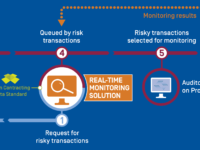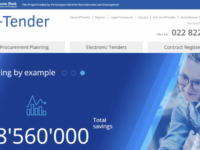Our Court launched a twitter account, seeking to rebuild trust. In Argentina, the justice system is the institution with the lowest public trust. Through this account we publish every judgement, hearings, the staff resumes and the Judge's personal leaves. This is not the norm in our country and constitutes a pioneering innovation that demands deep cultural change from public servants and our users too. We improved engagement with the public and inspire other teams to deliver a more efficient…
Innovation Tag Opengov: transparency
In one sentence, the floating Parliament Accounts Committee between Small Pacific Islands State creates a multi-national team of experts who simplifies budget processes while transparently saving resources. A cost-effective measure to share expertise, boost accountability and communicate openly about Governments’ budget processes while providing MPs with the best guidance possible.
As a criminal court judge I felt the need to implement concrete actions to establish a new way of adjudicating in my country (Argentina) by relying on Open Government’s principles. Among some of the implemented policies, we publish all of the court's decisions, the court hearings' agenda, statistics and reports on the administration of the court and the biographical information of the court's employees. We do so by using our Twitter (@jpcyf13) and YouTube accounts.
MTender is a revolutionary tool which will transform the way public funds are spent in Moldova, a country with a long history of corruption.
The world’s first fully digital public procurement system, MTender uses open data to manage every element of the public contracting system. This enables officials to do their jobs better, citizens to hold the government to account, taxpayers to get a better deal, and businesses to compete on a level playing field.
Case Study
Digital tools to monitor and predict risks in auditing Ukraine’s revolutionary online public…

Ukraine is transforming its public procurement system to bring public procurement into the open, so citizens get a better deal and government runs smoothly. EBRD has supported the Ukrainian government to develop a new legal framework, and to develop cutting edge tools which can process vast amounts of procurement data in real time. State auditors can now quickly & pre-emptively spot risks or inefficiencies in the system and address them. It is the first innovation of this kind in the world.
MEData is the strategy for providing, appropriating and using the public data of Medellin. It will become the official information source of the city, where citizens will have constant and reliable data that can be used to generate knowledge, promote technological innovation and boost economy. it is the first government platform that integrates strategic information sources into a big data technology and automatically synchronizes them with an open data portal.
Citizens Connect is a civic tool that provides access to information and public services, to support effective service delivery by gathering feedback and highlighting issues which are of concern to Citizens to the relevant Government agency for timely resolution. The platform also serves as a portal for civic awareness, public service information, citizen reporting, inquiries, and advice. This initiative fosters accountability and transparency in public services.
The promotion of competition has been identified as one of the major challenges of the Public Procurement System in Colombia. Despite its importance, it was only in 2019 that a tool allowing to effectively monitor the participation of the interested parties on the bidding processes was developed and implemented by the Colombian Procurement Agency. Thanks to this tool, participants are able to diagnose flaws, and make suggestions or requests for improvements.
The project of monitoring open government commitments was developed with the objective of guaranteeing the fulfillment of the Brazilian initiatives in the scope of the Open Government Partnership. It is a process carried out jointly, periodically and proactively by government and civil society, with significant results for society as a whole. This approach is materialized through specific monitoring and evaluation actions that provide transparency regarding the implementation of Brazilian OGP…
It is currently difficult for the public to follow how EU laws are made. This is because the Council - where Member States are represented - remains relatively inaccessible. Documents are difficult to get hold of and Member States’ positions on a given law are not public. The EO opened an own-initiative inquiry into Council legislative transparency and has called for a series of transparency steps to be taken.

